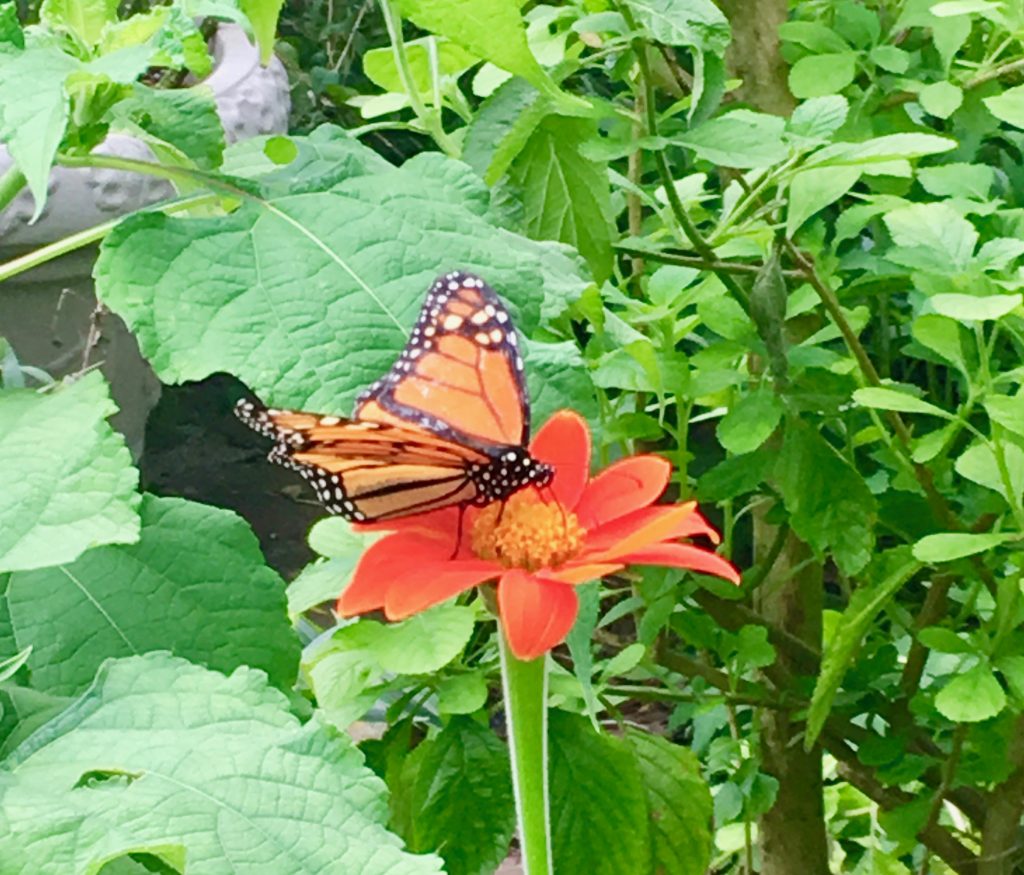| I feel closer to God in my garden than anywhere else on earth.
I consider it our sacred job to support and protect the precious soil and creatures that live here. Butterflies and frogs are indicator species that show how healthy our environment is. If our environment lacks these species, then we need to be very concerned, and we need to take immediate steps to correct it For this reason, I do three things I feel are vitally important for the health and well-being of my garden: plant flowers that attract pollinators, avoid using pesticides, and provide clean drinking water for animals. When I plant my garden every year, I plant fragrant, pollen-rich, and nectar-rich flowers. These will provide safe, nourishing food for butterflies and draw more pollinators to my vegetables, fruits, and herbs. This helps the plants produce more food, and it makes my garden more beautiful to be in. Now, this is more important than ever, because many GMO plants and hybrid flowers (like the “knock-out roses”) have flowers that have NO Nectar. Currently, at least four species of large bumble bees are now extinct because they quite literally starved to death due to enormous areas full of flowers lacking nectar and pollen. I try my best to support the pollinators in our web of life: bees, hummingbirds, dragonflies, bats, and butterflies. These fragile creatures do so much for the health of our environment, but they need our support. If you care about this, buy plants for your garden or landscaping that are rich in fragrance, pollen, and nectar. Organic, native heirloom plants are always best. Heirloom plants have been handed down from generation to generation of gardeners in a region, so they have proven to do well in a particular soil and temperature. If you inter-plant some of the flowering plants with your hedgerows, you will provide additional forage for pollinators of all kinds. Stagger your plantings so there is enough food throughout the year. Here are seven outstanding, nectar-rich flowering plants that attract butterflies and pollinators to keep your garden lovely, fragrant and environmentally healthy!
A few more plants to add are marigolds, zinnias, violets, lilies, red penstemon, and crocuses. You can grow berries in your garden, or herbs such as lavender, sage, parsley, and dill. Butterflies love dill for their caterpillars. I have some of the most beautiful Monarch butterfly caterpillars in my garden when I plant dill amongst my flowers. You can also plant female yaupon holly, poplar trees, and redbud trees. To make your garden non-toxic and healthier, stop using pesticides! Pesticides kill our pollinators, poison the environment, destroy vital nutrients in the soil and the food we grow, and can cause nerve damage to anyone exposed to them. Their runoff pollutes our water, too. Avoid using pesticides in your yard or garden. On the environmental side, the weed killer, Round -Up Ready with the chemical glyphosate in it, has virtually wiped out milkweed in Midwest corn and soybean fields. This has been a major factor in the dramatic 20-year decline of monarch butterflies that depend on milkweed for food and reproduction. It’s also important to provide safe, clean drinking water for all the wildlife, including the pollinators. Every living creature needs water to survive. I put a drip on my birdbath so it has a ripple, which is easy for pollinators and hummingbirds to see. The ripple also prevents mosquitoes from breeding in the water, because mosquitoes only lay eggs in still, standing water. I also put water on the ground to help the local wild animals have enough water to drink. It’s a web of life, and I try to support all the precious parts of that web that God gave us. Over the last few decades, a handful of agrichemical giants have acquired 65% of the world’s seed supply, so I highly recommend that you buy organic seeds you like, in bulk, and keep them for your own personal use. I buy a variety of organic heirloom seeds in bulk to use in my garden, and for growing my sprouts, which I put in my salads. Here are a few organic, non-GMO seed companies that The Health Ranger – under Gardening, they have healthy choices for your garden. For a few gardening tips, I made a short organic gardening video, and if you wish to view it, please click here. With these organic, healthy gardening tips, I hope you have a healthy and lovely garden! |
|
copyright@nancyaddison2025 Nancy’s 7 books on Amazon are also in Audio and some of them are in large print: Medical Disclaimer: Do not use the information provided in this blog, audio podcast, article, video for diagnosing or treating a health problem or disease, or prescribing medication or other treatment. Always speak with your physician or other healthcare professional before taking any medication or nutritional, herbal or homeopathic supplement, or using any treatment for a health problem. If you have or suspect that you have a medical problem, contact your health care provider promptly. Do not disregard professional medical advice or delay in seeking professional advice because of something you have read in this email. Information provided in this video or audio and the use of any products or services related to this video by you DOES NOT create a health counselor-client relationship between you and Nancy Addison, certified health counselor. Information and statements regarding dietary supplements have not been evaluated by the Food and Drug Administration and are not intended to diagnose, treat, cure, or prevent any disease. |


